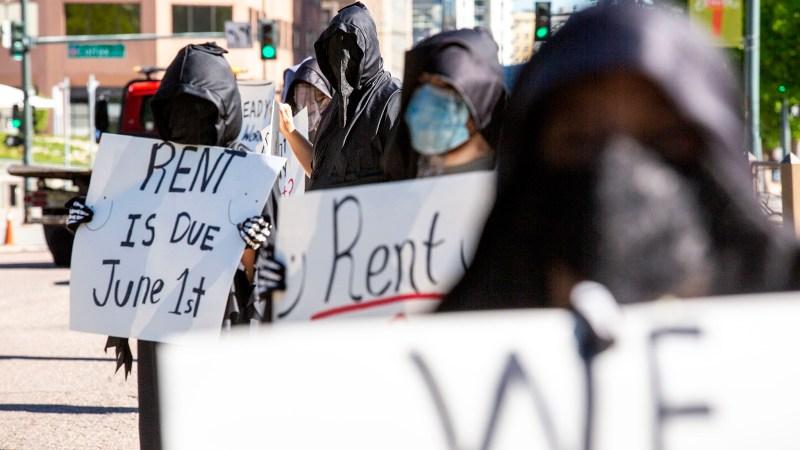
Gov. Jared Polis expects that eviction cases will resume in Colorado's courts in June, allowing for the removal of people and businesses from rental properties. Meanwhile, state lawmakers are working on a law to extend protections for renters and homeowners.
Last month, Polis ordered courts and law enforcement to freeze evictions throughout the state. That order is set to expire this week. Polis did not directly answer a question about whether he would renew the order, but he expects a “slow return to normalcy," he said at a press conference on Tuesday.
“I believe the courts will have some increased capacity in June (to handle evictions),” the governor said. “They certainly have other priorities, but there are probably some folks that have been delinquent for some time that could be evicted."
If the eviction ban expires, judges and sheriffs across the state would decide how to handle removals. Housing advocates have warned that a surge of evictions could arrive after the courts reopen, but it’s impossible to say how large that surge will be.
Data from the Colorado Apartment Association shows that delinquency spiked by only a few percentage points. About 89 percent of renters paid May rent by the fifth day of the month, an improvement from April, according to a CAA survey.
However, that survey includes many larger apartment chains where rent and incomes skew higher.
The state legislature is considering a bill to give renters more options, an idea that Polis mentioned. Sen. Julie Gonzales is leading the charge.
"We're so glad that Gov. Polis put forward an eviction moratorium through an eviction order, and now it's our turn to act. The ball is now in our court here in the legislature," she said in an interview.
"What will be policy decisions moving forward to protect both residential renters and small businesses?" Gonzales asked.
She's urging the governor to extend the eviction order to ensure there's no gap between protections. The governor's office didn't say on Tuesday whether or not Polis would extend the ban.
The administration "is encouraging landlords and tenants to develop a sustainable repayment plan and has offered models for consideration and is also working with lawmakers to takes commonsense steps to protect people’s credit and rental history," wrote spokesperson Conor Cahill.
"As session resumes, the Governor encourages the state legislature to consider how best to help hardworking people weather the impacts of the COVID-19 pandemic including renters, small businesses, and homeowners. The Governor has indicated that the courts have not been functioning at a capacity level where they could process non-public safety-related evictions for April and May, but that they will likely slowly begin to do so in June.”
The bill may include:
- Extending anti-eviction protections for people who can show they're suffering financial hardship from the crisis.
- Creating anti-foreclosure protections for some homeowners, similar to what the CARES Act offered for some homeowners.
- Extending the “cure period” during which people can repay their back rent. Under current law, renters have 10 days to pay after a landlord posts an eviction notice; in some cases, landlords who posted notices earlier in the crisis are not legally obligated to accept rent repayment. The bill could allow people to repay back rent until a court rules on the case.
- Barring credit agencies from including reports of evictions.
Gonzales said lawmakers are still finalizing the language. They haven't introduced the bill yet.
Many tenants’ situations have improved as unemployment benefits and stimulus checks have arrived, according to housing attorney Zach Neumann, founder of the COVID-19 Eviction Defense Project.
But his group’s modeling shows a threat of mass evictions as federal benefits expire this summer.
“Our bigger concern now is what happens in July, in a world where an eviction moratorium is not in place and federal benefits are starting to expire,” he said. “That for us is when eviction risk is going to peak.”
And those unemployment benefits aren't helping everyone. The state's unemployment call center is swamped with thousands of requests for help and applications are pouring in by the tens of thousands.
Meanwhile, undocumented people are ineligible for federal stimulus and unemployment benefits.
"I don’t see the need for assistance tapering off for a lot of communities," said Dre Chiriboga-Flor, state co-director for the 9to5 advocacy organization. "We can feel that desperation."
This article was updated with comment from the governor's office.









